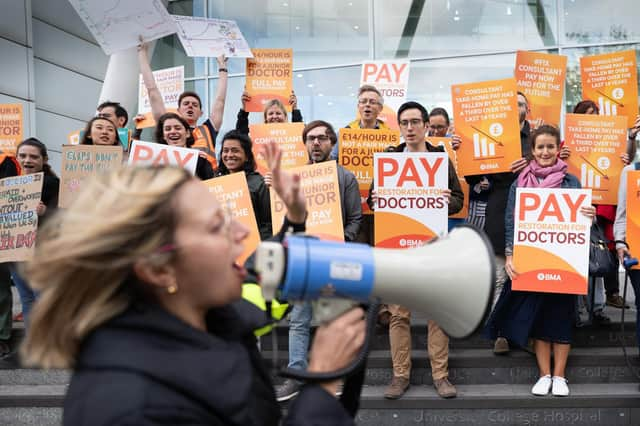Ben Lowry: There is now essentially no opposition to the coming general strike in Northern Ireland


That fact is remarkable enough.
Even more remarkable is that barely a person is making an open and coherent case against such industrial action.
We report on page seven about a the mother of a child with special educational needs who is concerned about impact of the strike on her child, which is perfectly understandable. But I am not talking about such specific personal concerns about the impact of one particular group of striking workers.
Advertisement
Hide AdAdvertisement
Hide Adi am talking about a politician or commentator challenging the overall merits of a strike. Among Stormont’s 90 MLAs, I am not aware of one.
In a normal democracy even minority or unusual political positions can typically find the support of around 20% of those representatives elected to a legislature, or perhaps even only 10% of them.
Imagine a vote at Stormont on a popular policy in which the view of the 90 MLAs was so overwhelmingly in favour that only 10% of them opposed it. That would mean a vote of 81 MLAs in favour of the said popular policy and only 9 MLAs against – a 90% to 10% divide.
Such votes are rare (although I remember from my teens an even more overwhelming one-sided vote in the US Senate, when the US Supreme Court overturned the conviction of a radical activist who had been jailed for a year for burning the American flag. The court said that burning the flag was a legitimate expression of free speech, and the 100 senators voted by 97 to 3 to condemn the judgement).
Advertisement
Hide AdAdvertisement
Hide AdIn such overwhelming votes there is at least some opposition. Yet no MLA is prepared to challenge the coming general strike.
And I have been on at least two BBC broadcasts where I was alone arguing against strikes, up against two union leaders supporting it.
Here is a list of the unions taking part on Thursday coming:
British Dietetic Association (BDA); Charted Society of Physiotherapists (CSP); GMB; Irish National Teachers' Organisation (INTO); Society of Radiographers (SoR); Siptu; National Association of Headteachers (NAHT); National Association of Schoolteachers and Union of Women Teachers (NASUWT); National Education Union (NEU); Nipsa; Royal College of Midwives (RCM); Royal College of Nurses (RCN); Ulster Teachers Union (UTU); Unison; Unite.
Advertisement
Hide AdAdvertisement
Hide AdThe action is going to cause massive disruption to key public services.
There is no doubt that the cost of living crisis is causing challenges and hardship across the UK. There is little doubt that some parts of the public sector are under resourced, or experiencing huge pressure. But the reasons for the cost of living crisis are complex, including international factors such as inflation and energy supplies. Many of the pressures on, for example, the NHS are largely the fault of Stormont.
Cowardly politicians have ignored the urgings of experts who say that NI needs a more efficient healthcare system. This need for change would need to be explained to voters but almost no MLAs are prepared to do that.
There are other arguments to be made against strikes that are simply never made. For years I have been writing about the way in which public sector pensions are not merely more generous than private sector pensions, but far more so. In fact I think if workers in the private sector knew the extent to which the taxes towards which they contribute were propping up occupational pensions in the public sector that they will never, ever enjoy there would be outraged protests.
Advertisement
Hide AdAdvertisement
Hide AdBut pensions are complex, and this disparity is not understood, and so instead private sector workers are often sounding their horn as they drive pass union strikes against modest reforms to lavish public sector pensions.
There are strikes all across the UK, not just in Northern Ireland. But that quiet voice of reason, the economist Dr Esmond Birnie, has highlighted Office for National Statistics data on the number of working days lost in disputes up until September of 2023. For the 13 months during June 2022 to September 2023 NI’s strike rate was 72% higher than the Great Britain average.
Is this a surprise? All Stormont parties have more or less made clear that if the assembly returns the demands of strikers will be met. And that will be under a Stormont that has been restored at the urging of the Tories, a party that in 1979 was swept to power when industrial action made the UK almost ungovernable.
• Ben Lowry (@BenLowry2) is News Letter editor